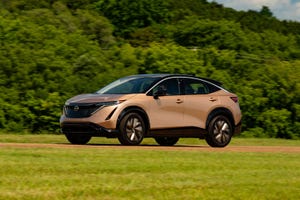
Nissan Follows Ford, GM and Adopts Tesla Charging - CNET
Nissan Follows Ford, GM and Adopts Tesla Charging
Electric vehicles from Nissan will soon work with Tesla Superchargers.
The Nissan Ariya electric SUV.
Nissan
Nissan is the latest car manufacturer to ensure its electric vehicles can use Tesla chargers. Nissan announced an agreement with Tesla on Wednesday to adopt the North American Charging Standard, or NACS, beginning in 2025.
Nissan’s first battery-powered SUV, the Nissan Ariya, will come with a NACS charging adapter from 2024. And in 2025, Nissan EVs in the US and Canada will have a NACS port so you can use Tesla Superchargers.
“We are happy to provide access to thousands more fast chargers for Nissan EV drivers, adding confidence and convenience when planning long-distance journeys,” said Jérémie Papin, Nissan Americas chairperson.
Nissan follows General Motors and Ford, which earlier this year said they would adopt Tesla’s charging standard for their EVs.
Read more: All the Electric Vehicles That Come With Free Charging in 2023
Nissan plans to have 40% of its sales in the US made up of EVs by 2030 — including two new fully electric vehicles that will be assembled in the US from 2025.
Earlier this month, Kentucky became the first state to require Tesla’s NACS connectors at federally funded charging stations on highways. A $1.2 trillion infrastructure bill passed in November 2021 set aside $7.5 billion to create 500,000 public EV chargers across the US by 2030.
Electrify America, the largest direct current fast-charging network, also announced last month that it will be adding NACS connections to all of its charging stations by 2025.
Annual EV sales are expected to surpass 1 million vehicles for the first time this year, and prices are coming down thanks to the new $7,500 EV tax credit.
If you’re looking to make the switch to electric, here are the best EVs to buy in 2023, every EV currently available ranked by range and the most affordable electric cars now on the market.
Read more: What Biden’s Proposed EV Charging Standards Mean for You

